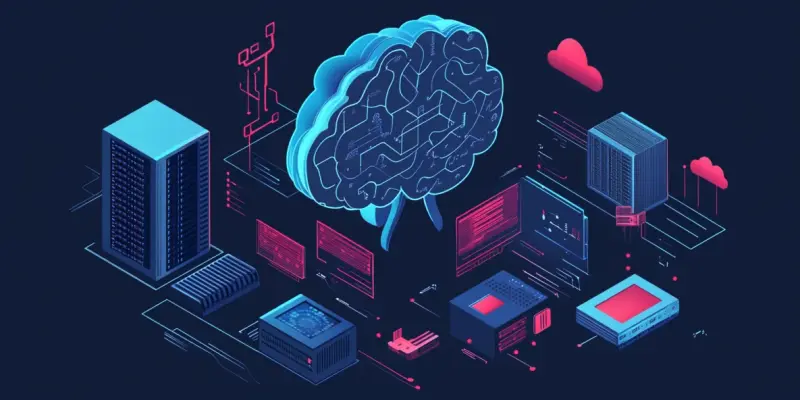As artificial intelligence (AI) continues to revolutionize business processes and technologies, the demands on enterprise data storage systems are escalating. Traditional storage models, once the backbone of enterprise data management, are now being pushed to their limits. This article explores the challenges and emerging solutions in the realm of enterprise storage for AI-driven workloads.
The Strain of AI on Traditional Storage
AI’s Data Demands
AI technologies require vast amounts of data for training and inference, placing unprecedented strain on existing storage infrastructures. The exponential growth of unstructured data further complicates this scenario, necessitating new approaches to data management that traditional systems were not designed to support. Enterprises are finding that their legacy storage solutions are ill-equipped to handle the volume, variety, and velocity of data generated by AI applications.
The need for rapid data retrieval, processing speed, and efficient data management is critical. Traditional enterprise storage systems typically lack the agility and scalability needed to keep up with AI’s intensive data requirements. Consequently, organizations must explore advanced storage solutions capable of providing high-speed access and large-scale data management efficiently.
Data Silos and Accessibility Issues
One of the most pressing issues in the current enterprise storage landscape is the persistence of data silos. These silos segment data into isolated pockets, restricting accessibility and hindering scalability. This fragmentation of data not only slows down AI processes but also complicates data governance and security.
Data silos can hinder the seamless flow of data, which is crucial for AI-driven workloads that depend on diverse and extensive datasets. Overcoming these silos often requires significant effort in data integration, migration, and consolidation. Accessibility issues brought on by vendor lock-in mean that businesses may end up using disparate systems that do not communicate effectively, undermining the potential benefits of adopting AI technologies.
Evolving Storage Needs for AI
Intelligent Data Orchestration
The future of enterprise storage lies in effective data orchestration rather than merely increasing storage capacity or performance. Solutions that provide a cohesive and seamless integration of data across various platforms are essential. Companies like Hammerspace are at the forefront of this trend with their Global Data Platform, which aims to break down silos and offer smooth data access regardless of its location by leveraging parallel network file systems (pNFS).
Intelligent data orchestration involves automating and managing the data lifecycle across different storage environments, including cloud, on-premises, and hybrid setups. This method enables enterprises to move data seamlessly, optimize storage usage, and ensure data is readily accessible to AI applications.
Flexibility and Independence
Storage solutions need to be independent of the underlying infrastructure to avoid vendor lock-in and extend the lifespan of data management systems. Komprise’s emphasis on unstructured data management and their strategy for tying this data to AI governance and security underscores a broader move towards flexibility and long-term sustainability in storage solutions. This approach ensures that data remains accessible and manageable, even as the underlying hardware evolves.
Flexibility in storage solutions means being able to adapt to changing data requirements without being restricted by proprietary systems. Komprise’s strategy involves creating scalable storage architectures that support AI-driven workloads while maintaining robust governance and security protocols.
Trends in Enterprise Storage Solutions
Open Source and Cost Management
There is a significant shift towards open-source solutions in the enterprise storage market. Open-source systems help to commoditize the market, reduce costs, and lower entry barriers, making advanced storage solutions more accessible. This trend is particularly crucial as IT departments face increasing pressure to manage growing data volumes within constrained budgets. TrueNAS, for example, is driving this shift by offering cost-effective, scalable storage solutions that democratize access to advanced storage technologies.
Security and Governance
As AI initiatives grow, so do the concerns around data security and governance. Managing sensitive data to avoid compliance risks is paramount, particularly in AI workflows. Effective governance frameworks are essential to protect data integrity and privacy while enabling robust AI applications.
Ensuring data security in AI-driven environments requires advanced detection and management capabilities to identify and protect sensitive information.
The Future of Enterprise Storage
Longevity and Sustainability
The average lifespan of storage solutions (3 to 5 years) is significantly shorter than the average lifespan of data (20 years) in enterprises. This discrepancy necessitates storage solutions that are independent of specific infrastructures and capable of outliving the hardware on which they run. Businesses are moving away from traditional vendor lock-ins and towards more open, integrated, and sustainable storage solutions that can support the rigorous demands of AI and unstructured data management.
Cost-Effective Scalability
As artificial intelligence (AI) continues to revolutionize business processes and technologies, enterprise data storage systems are facing increasing demands. Traditional storage models, once the cornerstone of enterprise data management, are now being stretched to their limits. The integration of AI into business operations necessitates a re-evaluation of storage infrastructures to handle the substantial and complex data workloads AI generates.
Modern AI algorithms require vast amounts of data to train and operate effectively, creating unprecedented challenges for data storage solutions. Enterprises must look into emerging technologies that can handle this data deluge efficiently and securely.
Innovative storage solutions such as cloud storage, distributed storage, and object storage are gaining traction to meet these needs. These approaches offer greater flexibility, scalability, and performance compared to traditional storage systems. As AI continues to evolve, having robust and adaptable data storage strategies will be crucial for businesses aiming to leverage AI for competitive advantage.

